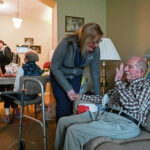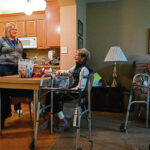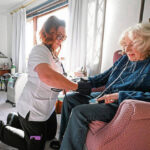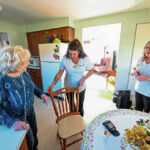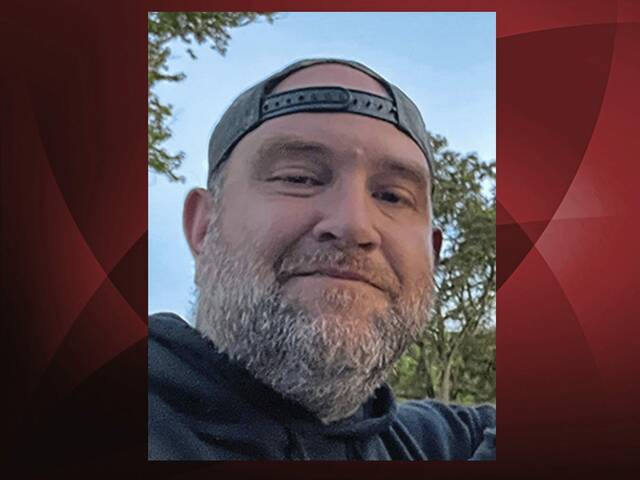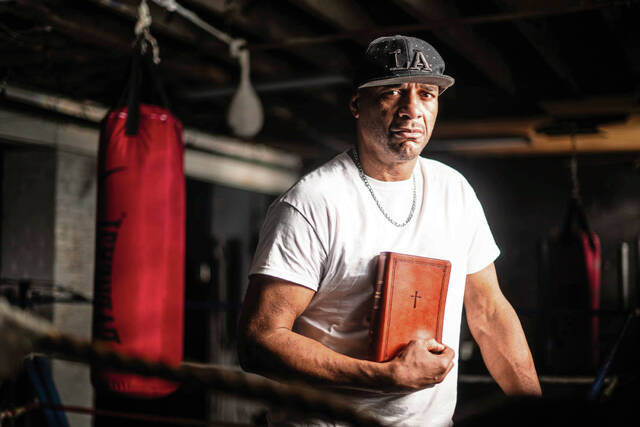A few days remain before Robert Patterson will mark his 97th birthday, on the day after Christmas.
No one can be sure how many more candles he’ll add to his cake.
He and his wife, Joyce, who is 90, have experienced declining physical health, including taxing respiratory conditions. It got to the point where, in January, they moved from their home in Hempfield to the Barnes Place senior living facility in Derry Township. They jointly entered hospice care in February.
“I have no lawn to mow and no windows to clean,” Robert Patterson said.
The couple’s care is provided by the visiting staff of Excela Home Care & Hospice. Part of the regional Independence Health System, it serves patients in Westmoreland County and parts of Fayette and Indiana counties.
In hospice care, when a patient is nearing the end of life, the focus of the medical and care-giving team shifts to supporting the person’s quality of life rather than efforts to cure any underlying medical condition.
There is an assumption a patient entering hospice care is not expected to live beyond six months, a guideline that is tied to Medicare coverage. But the experience of individual patients can vary widely, as evidenced by the Pattersons and by former president Jimmy Carter and his late wife, Rosalynn.
Like many who elect to receive hospice care, Rosalynn Carter entered the program toward the very end of her life — just days before her death Nov. 19, at 96.
But it’s also possible for patients to beat the odds and have hospice care extended. Jimmy Carter was 98 when he entered hospice in February and continues to endure.
When the Pattersons entered hospice care, Joyce said, “We probably made it here at just about the time we should, because I could no longer cook dinner and stand at the stove. At that point, my breathing was so bad, and Bob’s wasn’t much better. We needed to have extra help.
“I can’t take more than about three or four steps, and I’m very tired.”
“It’s a misconception that you’re admitted to hospice right before you die,” said Patti Lebin, director of transitional care and quality for Excela Home Health & Hospice. “Hospice is more about living better and improving the quality of your life to the highest level possible.
“We often see people electing hospice when they have a serious illness and after frequent hospitalizations. They see hospice as a way to improve the quality of life they have left.”
According to the most recent report to Congress by the Medicare Payment Advisory Commission, about 1.3 million Medicare recipients used hospice services before dying in 2021, up from 870,000 in 2010. The average hospice stay among that group increased from 87 days to 92 days over the same period, while the median stay fell slightly from 18 days to 17 days.
Moving from their longtime home to a care facility and entering hospice care was a difficult decision for the Pattersons, according to their daughter, Melody Ries, a psychoanalyst who lives in Seattle.
“With the health issues that they have, they needed a lot of care,” Ries said. “They stayed in their home as long as they could, but they just couldn’t do it anymore. My mother had a couple of different falls and broke her wrist.
“I have noticed the decline over the last six months in their health and their breathing. They don’t want to be put on ventilators and feeding tubes or anything like that.”
Registered nurse Lori Hank is the co-owner of Monarch Hospice in New Kensington. She’s compiled a list of hospice misconceptions that is displayed on the organization’s website.
“Everybody is so afraid of the word hospice,” she said. “People think that you have to have cancer and you have to be on your last breath. Some people get better and are discharged from hospice.”
Patients also can voluntarily revoke their hospice status if they want to try a new treatment that becomes available.
“Heath care is constantly changing,” said Dr Daniel DiCola, hospice medical director for Excela. “An excellent decision one day may not be an excellent decision next week.”
In addition to cancer, DiCola noted, there are other life-threatening diseases which, in an advanced stage, can prompt patients to seek hospice services — including congestive heart failure, chronic kidney disease and chronic obstructive pulmonary disease.
Advanced dementia also can trigger entry into hospice care.
“It may be harder with a dementia patient to predict a timeline for how it progresses,” Lebin said.
Hank said, with dementia patients, it’s case by case.
If a patient’s condition or level of functioning declines, hospice care can be continued, she said. But, if the condition stabilizes or improves, the patient might no longer qualify for hospice.
The hospice provider might recommend a change in a patient’s medication to provide increased comfort. But, Hank said, it’s ultimately up to the patient what medications they are willing to take and whether they want to remain under the care of their existing doctor.
“It’s their decision and their life,” she said.
“No one can accurately estimate longevity,” DiCola said. But he does look to differentiate between patients with chronic illnesses who are slowly approaching the end of their life and others who are very close to death.
His focus with the former group, he said, is to “make them as functional as we possibly can make them.”
With the second group, he said, the goal is to “make the dying process as comfortable as we can” for the patients, while also providing support for their loved ones.
“Our program is kind of split in half,” Lebin said. “We provide clinical support in symptom management and also bereavement counseling to surviving family members. Our counseling team and spiritual team follow with the surviving family members for up to a year or longer.”
Similarly, Monarch offers bereavement services to family members for 13 months after the death of a hospice patient. It also conducts periodic memorial services for the families, as well as grief support meetings for the hospice staff who must deal with the repeated loss of patients with whom they’ve formed caring relationships.
“It is an emotional toll,” Hank said, noting staff sometimes need to “take a break and regroup.”
Registered nurse Jody Guidas, who provides care for the Pattersons, acknowledged it’s a hard task to become involved with patients who are on the final leg of their life’s journey. At the same time, she said, “It’s such an honor. You’re treating the whole patient, their spiritual, physical and emotional needs.”
The relationship between hospice caregiver and patient becomes especially important for those such as the Pattersons, whose four children live far away. Ries and her siblings call regularly for phone chats and visit when they’re able. But, for ongoing face-to-face interaction, Guidas said, “We’ve become a family to them.”
Ries said, “It’s been tough to be so far away from them at this time of their lives when they need so much.”
With the hospice program, she said, “We know there is somebody there who is able to help out and to respond and take care of their needs. It’s a huge comfort.”







